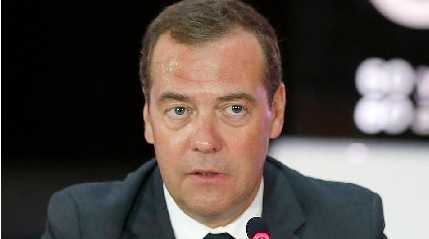
LONDON/ZAPORIZHZHIA, Ukraine, Sept 27 (Reuters) - An ally of President Vladimir Putin issued a stark new nuclear warning to Ukraine and the West on Tuesday as Russia began releasing results of referendums it bills as a prelude to it annexing four Ukrainian regions.
Moscow's latest broadside came as European countries rushed to investigate unexplained, major leaks in two Russian natural gas pipelines under the Baltic Sea that posed risks of explosions and the sinking of any ships that enter the area.
The Kremlin, which has blamed technical problems for earlier cuts in Russian gas supplies to Europe, said it could not rule out sabotage, without saying who was to blame.
Moscow's confrontation with the West has driven up global inflation and sharpened energy and food crises in many countries since its Feb. 24 invasion of Ukraine, which led to tough Western sanctions and Russian retaliatory measures.
Tuesday's nuclear warning by Dmitry Medvedev, deputy chairman of Russia's Security Council, is one of several issued by Putin and his associates in recent weeks.
Analysts say they are designed to deter Ukraine and the West by hinting at a readiness to use tactical nuclear weapons to defend newly annexed territory, where Russian forces have faced strong Ukrainian counteroffensives in recent weeks.
Medvedev's warning differed from earlier ones in that he predicted for the first time that the NATO military alliance would not risk a nuclear war and directly enter the Ukraine war even if Moscow struck Ukraine with nuclear weapons.
"I believe that NATO would not directly interfere in the conflict even in this scenario," Medvedev said in a post on Telegram.
"The demagogues across the ocean and in Europe are not going to die in a nuclear apocalypse."
'SHAM' REFERENDUMS
First partial results from votes cast inside Russia on whether the four partly Russian-occupied regions of Ukraine should be incorporated into Russia showed overwhelming majorities in favour, Russia's state news agency RIA reported.
It was a widely anticipated announcement after a five-day referendum that Kyiv and the West have denounced as a sham and say they will not recognise. Ukraine urged the EU to impose new punitive sanctions in response to votes it said were carried out at gunpoint in many cases.
Putin said on state TV the votes were designed to protect people from what he has called the persecution of ethnic Russians and Russian-speakers by Ukraine, something Kyiv denies.
"Saving people in all the territories where this referendum is being held is at the top of our minds and the focus of attention of our entire society and country," Putin said.
He earlier discussed with officials the mobilisation of farmers to fight in Ukraine, the latest step in a campaign he announced last week to support what Moscow calls its "special military operation" after this month's battlefield reverses.
The mobilisation drive has sent thousands of Russians rushing to cross Russian borders into neighbouring countries.
Nearly 66,000 Russians entered the European Union, mostly via Finland and Estonia, between Sept. 19 and 25, a 30% increase from the previous week, the bloc's border agency Frontex said.
Russian government officials have repeatedly warned they might use nuclear weapons if Kyiv's forces, who control some of the areas Moscow claims, try to take what Russia will soon regard as sovereign territory.
The United States has said it spelled out privately to Moscow what it described as "catastrophic consequences" for Russia if it resorted to nuclear weapons.
Ukrainian President Volodymyr Zelenskiy said he discussed with NATO Secretary General Jens Stoltenberg on Tuesday further military support from the Western military alliance.
Earlier, Zelenskiy's adviser Mykhailo Podolyak said Ukraine was preparing for the possibility of a Russian nuclear strike, but the onus was on nuclear-armed states to deter it.
"...Where exactly should we evacuate people in the event of a Russian nuclear strike against Ukraine?" he asked in an interview with Swiss newspaper Blick. "That is why the use of nuclear weapons is a question of global security."
'NOTHING MORE TO FEAR'
In central Kyiv, music teacher Andrii Liubomyr said he was unfazed by the possibility of a nuclear strike.
"So what? What do we have to fear after February 24? There is nothing more to fear," he told Reuters, referring to the start of the Russian invasion.
Viktor Yermolenko, 58, also shrugged off Medvedev's threat: "Our Ukrainian nation can’t be broken by a nuclear strike." Podolyak said Ukrainians who had helped Russia organise the annexation referendums would face treason charges and at least five years in jail.
"We have lists of names of people who have been involved in some way," he said, adding that Ukrainians who were forced to vote would not be punished. Ukrainian officials have reported ballot boxes being taken door to door and residents being coerced into voting in front of Russian troops.
None of the provinces is fully under Moscow's control and fighting has been underway along the entire front line, with Ukrainian forces reporting more advances since they routed Russian troops in a fifth province, Kharkiv, earlier this month.
The head of the upper house of the Russian parliament said the chamber may consider the incorporation of the four regions into Russia on Oct. 4.
Fighting raged in various parts of Ukraine on Tuesday.
Zelenskiy said the Donetsk region in the east remained his country's - and Russia's - top strategic priority, with "particularly severe" fighting engulfing several towns.
Pavlo Kyrylenko, the regional governor, said three civilians had been killed in the past 24 hours.
Ukrainian forces in the south continued trying to keep bridges and other river crossings out of action to disrupt supply lines to Russian forces. The air force said it had shot down three Iranian-made drones operated by Russia after an attack on the Mykolaiv region.
Reuters could not immediately verify battlefield reports.




